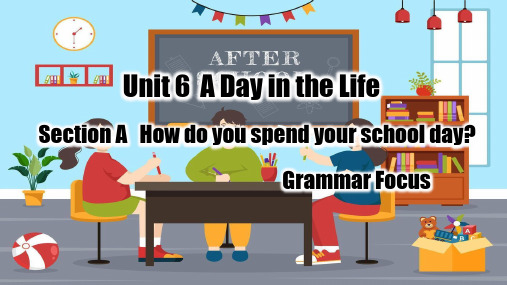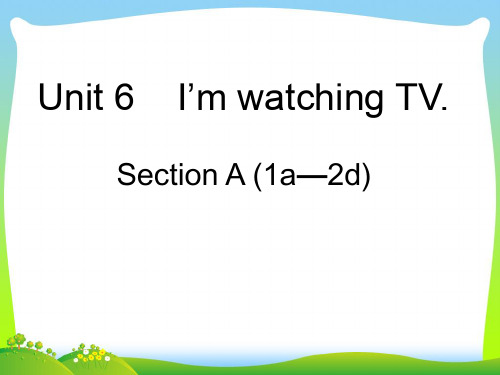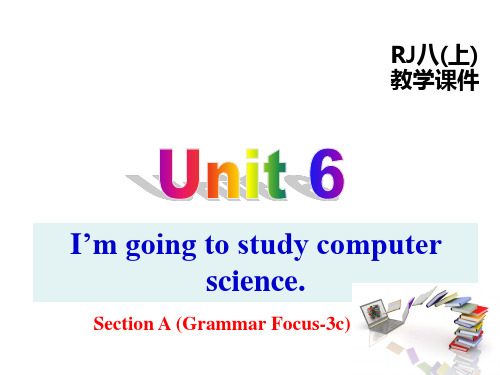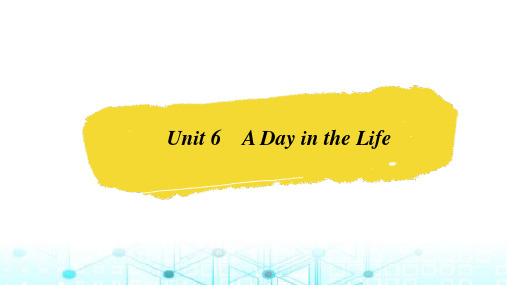Unit 6 section A(课堂PPT)
合集下载
初中英语人教版(2024)七年级上册:Unit 6 Section A(2a-2e)-教学课件

tressed words(非重读单词)I,to,about,your,do,you ...
句子中重读单词和非重读单词的规律: 一般来说,传达重要信息的实词需要重读,如 名词、动词、形容词、副词等;而起辅助作用的语法功能词一般不用重读,如人称代 词、介词、助动词、冠词等。 需要注意的是,重读的规则并非一成不变。当说话人想强调句子的某个细节或细节信息 对比时,可以加重关于该细节的单词读音。
Tom:Uh-huh.
Complete the sentences with what time or when.
We usually use what time _to ask about specific (具体的)times.But we use when for both specific times and any time period( 期 间 ) .
Tip 2:We can use some linking words, such as then,after that...to make the report more logical( 逻 辑 地 ) .
Share your day Complete your timetable and give a report.
I 'go to 'bed at 'nine 'o'clock.
Tip 1:We can stress some words to share our daily routines vividly(生动地)
Read the conversation and complete Tom's timetable.
Time
My activity get up
句子中重读单词和非重读单词的规律: 一般来说,传达重要信息的实词需要重读,如 名词、动词、形容词、副词等;而起辅助作用的语法功能词一般不用重读,如人称代 词、介词、助动词、冠词等。 需要注意的是,重读的规则并非一成不变。当说话人想强调句子的某个细节或细节信息 对比时,可以加重关于该细节的单词读音。
Tom:Uh-huh.
Complete the sentences with what time or when.
We usually use what time _to ask about specific (具体的)times.But we use when for both specific times and any time period( 期 间 ) .
Tip 2:We can use some linking words, such as then,after that...to make the report more logical( 逻 辑 地 ) .
Share your day Complete your timetable and give a report.
I 'go to 'bed at 'nine 'o'clock.
Tip 1:We can stress some words to share our daily routines vividly(生动地)
Read the conversation and complete Tom's timetable.
Time
My activity get up
2024人教版教材七年级英语上册Unit 6 Section A Grammar Focus教学课件

加-es
watch-watches
wash-washes guess-guesses
以辅音字母+y结尾变y为i再加es study-studies
以元音字母+y结尾在词尾加-s 以辅音字母+o结尾在词尾加-es
部分不规则变化
play-plays stay-stays say-says do-does go-goes have-has be-am/is/are
践;能够运用本单元所学的核心语法 4
结构描述自己的周末日程,学会合理 安排周末的时间,做到劳逸结合。
ቤተ መጻሕፍቲ ባይዱ
Lead-in
Let’s watch and think.
what, when, what time 这些都是什么词?
Presentation
3a Complete the questions with what, what time, or when.
Let’s review and complete the table.
原形
know find stay pass teach finish fly play carry
三单
knows finds stays passes teaches finishes flies plays carries
3a Read the sentences and pay attention to the prepositions.
When do they go to the music club?
They go on Monday afternoons.
What do you do after dinner?
Sometimes I read books or do my homework.
英语人教PEP版八年级(上册)Unit6SectionA(1a-2d)(共32张PPT)

to start?
H_s_ce_hio_so_lg_oainngd
to finish _h_ig_h_ college first.
2c Ask and answer questions A: What does Cheng Han want to be?
B: He wants to be a teacher.
A: When is Cheng Han going to start?
B: He is going to start when he finishes high school and college .
2d
Listen to the tape and find the answers to the questions.
course. What do you want to be?
keep on doing… 继续,坚持干…
be sure about… 对…有把握,确信…
Andy: My parents want me to be a doctor, but I’m not
sure about that.
try one’s best 尽最大努力
Unit6 Section A (1a-2d)
I am going to study computer science.
What is your dream job?
What do you want to be when you grow up?
想要成为
I want to be an actress.
Farmers grow us rice. Bakers make us bread. Artists draw us pictures. Postmen bring us letters. Teachers teach us English. Workers make us bags. Drivers drives us to places. Writers writes us books.
H_s_ce_hio_so_lg_oainngd
to finish _h_ig_h_ college first.
2c Ask and answer questions A: What does Cheng Han want to be?
B: He wants to be a teacher.
A: When is Cheng Han going to start?
B: He is going to start when he finishes high school and college .
2d
Listen to the tape and find the answers to the questions.
course. What do you want to be?
keep on doing… 继续,坚持干…
be sure about… 对…有把握,确信…
Andy: My parents want me to be a doctor, but I’m not
sure about that.
try one’s best 尽最大努力
Unit6 Section A (1a-2d)
I am going to study computer science.
What is your dream job?
What do you want to be when you grow up?
想要成为
I want to be an actress.
Farmers grow us rice. Bakers make us bread. Artists draw us pictures. Postmen bring us letters. Teachers teach us English. Workers make us bags. Drivers drives us to places. Writers writes us books.
新人教版七年级英语下册Unit6 Section A(1a—2d)优质课课件.ppt

▪ (3) 李雷的妈妈正在做汤。 ▪ Li Lei’s mother _____ _____soup. ▪ (4) 杰克正在玩电脑游戏。 ▪ Jack _____ _____ computer games. ▪ (5)三班的学生正在听CD。 ▪ The students of Class 3 _____ _____ to
What is she doing?
She is cleaning .
1a
Match the activities with the pictures.
1. watching TV ____ .
2. cleaning ___.
3. reading a
newspaper .
4. talking on the
_______.Do you want to ________ the movies? Jack: That sounds good.
▪ 2c Role-play the conversation in 2b.
2d Role-play the conversation.
▪ Jenny: Hello? This is Jenny. ▪ Laura: Hi, Jenny. It’s Laura here. ▪ Jenny: Oh, hi, Laura. What are you doing? ▪ Laura: Not much. I’m just washing my clothes. What
▪ (3) —Let’s _____ at the school gate. ▪ —That sounds good. ▪ (4)Where is your pen pal _____? ▪ (5) —What is Jane doing? ▪ —She is _____ TV.
人教版八年级英语上册Unit 6 Section A (GF-3c)教学课件

❖ What are you going to buy? 你打算买什么?
Sentence pattern
1. 肯定式: 主语 + be going to + do(动词原形) + …
2. 否定式:在助动词be后加not,即: 主语 + be + not + going to + do +...
3. 疑问式:把助动词be移到句首,即: Be+主语+going to do+...?
➢ be going to + v.
What do you want to be when you grow up? I want to be an engineer.
How are you going to do that? I’m going to study math.
What do you want to be when you grow up? I want to be a cook.
这和be作连系动词时的用法相似。
将来时也可用 “be + doing ”来表达 ,表示动 作按计划和安排发生,语气较委婉,动词多是 一些移动词。如:go、come、 leave、 start、 move、 sail、 arrive、 reach、 return、 drive、 travel、 remain、 land等。
grow up?
B: I __w_a_n_t__ to be a doctor. A: Wow! __H__o_w___ are you going to do that? B: I’m __g_o_i_n_g__ to study medicine at a university. A: Hmm … sounds difficult. __W__h_e_r_e__ are you
Sentence pattern
1. 肯定式: 主语 + be going to + do(动词原形) + …
2. 否定式:在助动词be后加not,即: 主语 + be + not + going to + do +...
3. 疑问式:把助动词be移到句首,即: Be+主语+going to do+...?
➢ be going to + v.
What do you want to be when you grow up? I want to be an engineer.
How are you going to do that? I’m going to study math.
What do you want to be when you grow up? I want to be a cook.
这和be作连系动词时的用法相似。
将来时也可用 “be + doing ”来表达 ,表示动 作按计划和安排发生,语气较委婉,动词多是 一些移动词。如:go、come、 leave、 start、 move、 sail、 arrive、 reach、 return、 drive、 travel、 remain、 land等。
grow up?
B: I __w_a_n_t__ to be a doctor. A: Wow! __H__o_w___ are you going to do that? B: I’m __g_o_i_n_g__ to study medicine at a university. A: Hmm … sounds difficult. __W__h_e_r_e__ are you
人教版七年级英语上册Unit6 A Day in the Life SectionA课件

自我评估量表
Poor
Rates(等级) Keep trying Not bad
Good
Excellent
要点1:o more reading before class 在课前阅读 do some reading是一种表达,泛指各种阅读活动;用于描述某人正在阅 读,或者用于建议某人阅读。 有类似表达的动词还有cleaning、washing、shopping、cooking等。 辨析:do some reading和read do some reading涵盖广泛,强调持续的阅读活动或建议。 read为动词,强调阅读的瞬间动作或内容。 当建议某人多读书时,应用do more / some reading,而不是read more books。
( C )1.Li Na is a middle school student.She always says“I will do my homework tomorrow.”But tomorrow never comes.
you’re willing to squeeze (挤) it. B.If you don’t work hard when you’re young,you’ll only regret (后悔) it when you’re old.
always usually
频率副词 总是
通常
频率百分比 100% 80%
often sometimes seldom
经常
有时
很少
60%
50%
30%
hardly ever 几乎不
10%
never 从不
0
迁移应用:
4.现在几点了?
What
time is it now?
Unit6SectionA课件人教版英语八年级上册
确保了胜利。
一、根据句意及汉语提示填写单词 1.The young man is one of the best pilots (飞行员) in the air company(航空公
司). 2.My uncle is a(n) engineer (工程师), and he built many roads in our city. 3.A cook (厨师) can make different delicious dishes. 4.I often see a violinist (小提琴手) play the violin at the street corner.
A.On a bus. C.At an airport.
B.In a zoo. D.On a farm.
( D )4.The shop in Riddle 4 is probably a
.
A.bookstore C.fish market ( C )5.The riddles are about
B.fruit store D.candy store
Keep on walking , and you’ll find the park on your left. 3.过去, 戴维对他的未来没有把握。
David wasn’t sure about his future in the past.
五、阅读理解(2022·天水)
Riddle 1 I carry a big bag every day. There are letters and parcels in the bag. I take them to people. Who am I?
There is going to be an important meeting this evening.
一、根据句意及汉语提示填写单词 1.The young man is one of the best pilots (飞行员) in the air company(航空公
司). 2.My uncle is a(n) engineer (工程师), and he built many roads in our city. 3.A cook (厨师) can make different delicious dishes. 4.I often see a violinist (小提琴手) play the violin at the street corner.
A.On a bus. C.At an airport.
B.In a zoo. D.On a farm.
( D )4.The shop in Riddle 4 is probably a
.
A.bookstore C.fish market ( C )5.The riddles are about
B.fruit store D.candy store
Keep on walking , and you’ll find the park on your left. 3.过去, 戴维对他的未来没有把握。
David wasn’t sure about his future in the past.
五、阅读理解(2022·天水)
Riddle 1 I carry a big bag every day. There are letters and parcels in the bag. I take them to people. Who am I?
There is going to be an important meeting this evening.
人教版英语九全Unit 6 Section A(1a-1c)课件(共21张PPT)
When was the
I think it was
telephone invented? invented in 1876.
When was the car It was invented in
invented?
1885.
When was the TV invented?
It was invented in 1927.
Can you match the inventions with the right inventors?
❖
9、要学生做的事,教职员躬亲共做; 要学生 学的知 识,教 职员躬 亲共学 ;要学 生守的 规则, 教职员 躬亲共 守。2021/7/282021/7/28Wednesday, July 28, 2021
Listening 1b Listen and match the
inventions with the years.
_d__ 1876 _a__ 1885 _c__ 1927 _b__ 1971
❖ Alice: Haha! How about cars? They were not invented yet, were they?
❖ Alice: Well, I know that you didn’t have a computer, Because we learned in school that personal computers were invented in 1971.
❖ Grandma: You’re right. But I have one now!
❖ Alice: Was your life very difficult when you were a kids?
人教版九年级英语 Unit 6 Section A(3a~3c) 精品课件
Warming-up Pre-reading While-reading Post-reading Homework
Read and match
Para. 1
1. Lu Yu and his book Cha Jing.
Para. 2
2. How tea spread to other countries.
Listen and read
Listen and read aloud.
Warming-up Pre-reading WWhhiillee--rreeaaddiinngg Post-reading Homework
Fill and retell
Shen Nong Lu Yu
Cha Jing
England the Chinese
around 1660
in the 19th century
Tea was brought to Korea and Japan.
Tea appeared in England.
The tea trade from China to Western countries took place.
Warming-up Pre-reading While-re points
1. Did you know that tea, the most popular drink in the world (after water), was invented by accident? 你知道茶这种在世界上最受欢 迎的饮品(仅次于水),是偶然被发明的吗? (1) by accident 意为“偶然地;意外地”。其同义短语为by chance。 ➢ Our meeting in Paris was by accident. (2) accident 名词,意为“事故;意外事件”;accidental 形容词, 意为“意外的;偶然的”。 ➢ He had an accident on his way to work. ➢ I don’t think our meeting was accidental.
Unit 6 第1课时 Section A(1a-2d)(精品课件)-【大单元教学】七年级英语上册
pears
strawberries
apples
tomatoes
hamburgers
oranges
vegetables
不可数名词:
bread
milk
既是可数名词也是不可数名词: salad
ice-cream
Play a game Quick eyes
—What are these? —They’re... Do you like…?
3 A: Do you like oranges? B: Yes, I do.
—Do you like…? —Yes, I do./No, I don’t.
5 Post-listening
1c Practice the conversations with your partner. Then make your own conversations.
hamburgers pears
tomatoes strawberries
oranges
ice-cream salad
bananas
2b Listen again. Fill in the blanks.
I like hamburgers. Do you like _h_a_m_b_u_r_g_e_rs_?
2. Girl: Do you like tomatoes? Boy: No, I don't like tomatoes.
3. Girl: Let's have ice-cream. Boy: Oh, no. Girl: No? Boy: I don't like ice-cream.
2c Practice the conversations in 2b. Give answers that are true for you. Do a survey in groups of four and give a report.
- 1、下载文档前请自行甄别文档内容的完整性,平台不提供额外的编辑、内容补充、找答案等附加服务。
- 2、"仅部分预览"的文档,不可在线预览部分如存在完整性等问题,可反馈申请退款(可完整预览的文档不适用该条件!)。
- 3、如文档侵犯您的权益,请联系客服反馈,我们会尽快为您处理(人工客服工作时间:9:00-18:30)。
Door closer, are you? When faced with _ri_v_a_l options, XiangYu proved to a wonderful decision-maker. He took his troops making a _r_a_id__ into enemy territory. To his troops’a_s_t_o_n_i_s_h_m_e_n_t, he ordered their cooking pots crushed and their sailing ships burned, which gave his troops only one _o_p_ti_o_n__: to win the battle. The battle turned out to be a great success on his side.
What’s the significance of doing the experiments? (Para.5)
Tips
The experiment enabled people to see why it’s always so hard for them to say “NO” to any opportunity that came to them. In everyday life, people just give excuses to keep options open.
To be continued
This story indicates that while closing the door for doing something, people may open the _w_i_n_d_o_w_ for achieving something more significant. Through conducting an experiment on humirraant’isonal________ behavior, Dr. Ariely, found that many students in his experiment just couldn’t bear to vseaenisthheir options _______ though they knew it would benleeftitgthoem to ______. He then emphasizes that in life the doors are actually closing slowly and we don’t see the future vanishing away. To be continued
Part III — (Paras. 5- _9_)
Part III mainly focuses on the experiment conducted by Dr. Ariely. He first explains the p_u_rp_o_s_e_a_n_d__si_g_n_ifi_c_a_n_ce__ of the experiment, and the process of the students l_o_si_n_g_m_o_n_e_y. Then he points out the real cause of the students’_i_rr_a_ti_o_n_al_b_e_h_a_v_io_r__. Finally he emphasizes that in life the doors are actually closing slowly and we don’t see the future _va_n_i_sh_i_n_g_a_w_a_y__.
Part II — (Para. 4)
Part I serves as a transition from the ancient story of Xiang Yu to the _m_o_d_e_r_n_s_t_o_ry of the students at MIT. Through conducting an experiment on human’s_i_rr_a_ti_o_n_a_l _b_e_h_a_vior, Dr. Ariely found that people just couldn’t bear to see their options vanish though they knew it would benefit them to let go.
What is the message the author wants to send out from this text? (Paras.13-14)
Tips
People cfocusing their energy and attention in a more concentrated fashion. They will have more with fewer but carefully chosen options.
According to Dr. Ariely’s book, Predictably Irrational, what might be a weakness of human beings? (Para.4)
Tips
His experiment shows that people just couldn’t bear to see their options vanish though they knew it would benefit them to let go.
What’s the winning strategy when playing the computer game? (Para.6)
Tips
Students should quickly check all the doors and keep clicking on the one with the highest cash. They should absolutely ignore the vanishing doors.
How did students loss money because of their irrational efforts to keep the vanishing doors open? (Para.7)
Tips
In the game, any door left un-clicked for a short while would vanish. Instead of ignoring the vanishing doors, the students rushed to click on them before they vanished, so they lost money in the end.
Part V — (Paras. 13-14)
Part III concludes the essay, and meanwhile it raises the question if _m_o_r_e_i_s_b_e_tt_e_r_t_h_an__le_s_s_ . We should close certain doors in order to allow the right windows of opportunity and happiness to open.
• Less is More
2
Unit 6 Section A
Door closer, are you?
FOREIGH LANGUAGE TEACHING AND RESEARCH PRESS AIR FORCE ENGINEERING UNIVERSITY
Tips
The text starts with a question about what Xiang Yu, a Chinese imperial general, would do when facing __ri_v_a_l o_p_t_i_o_n_s.(Para.1)
In the text, what does Dr. Ariely suggest in order to balance our life? (Paras.10-12)
Tips
People should: •prohibit overbooking, •reduce options, •delegate tasks to others, •give away ideas to others to pursue.
In the late years of the Qin Dynasty (秦朝, 221 - 206BC), Xiang Yu (项羽) launched a rebellion. After crossing the Zhang River (漳河), Xiang Yu ordered his soldiers to sink all the boats and break their cooking pots, leaving only a three-day supply of food for each soldier. He warned them that there was no way to retreat; the only thing they could do to survive was to advance and fight. Xiang Yu’s boat burning strategy gave his men no choice but to go forward to fight with skill and passion. After nine furious war, the Qin army was finally defeated.
Part IV— (Paras. 10-12)
Part IV suggests how we can balance our lives by reducing u_n_n_e_c_e_s_s_a_r_y_o_p_t_io_n_s.
